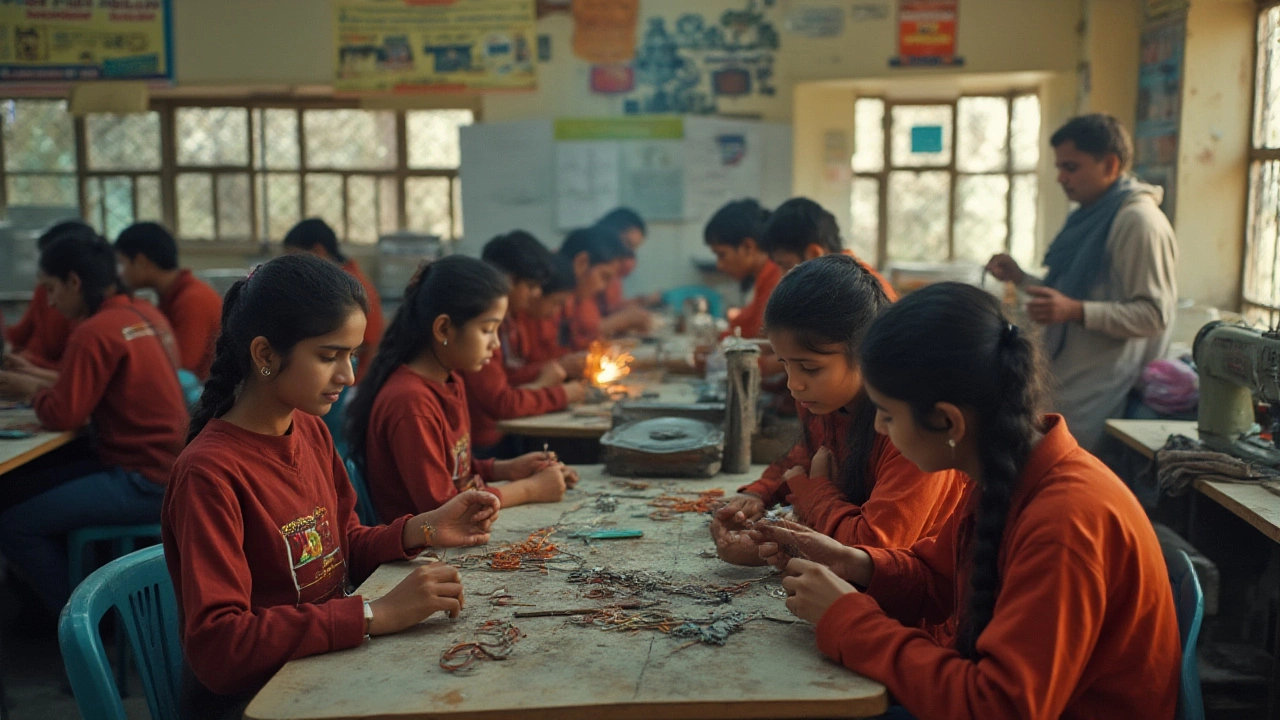Picture this: you want a job that lets you work with your hands or use skills that actually matter in the real world. Sitting through years of endless theory just isn’t for you. That’s where vocational training flips the script. It’s not just about memorizing stuff—vocational training is the secret sauce behind so many people who jump straight into the workforce, prepared to take on real responsibilities, from fixing cars to launching digital campaigns.
What is Vocational Training?
Vocational training is a hands-on style of learning that’s all about prepping you for specific jobs. Unlike traditional classroom education, it zeroes in on practical skills—no frills, just what you need for your future profession. Think of it as learning by doing, instead of learning by reading. For example, an electrician doesn’t need to write essays about circuits—they need to know how to safely wire a building. Vocational programs cut straight to those skills.
You’ll find vocational courses everywhere, from dedicated trade schools and polytechnics to quick, targeted workshops. The focus is always the same: take the skills you’ll directly need in a job and drill them until they stick. You might have heard it called technical education or career training, but it all means the same thing—becoming job-ready without unnecessary detours.
If you’ve ever wondered why some people get hired right out of school, it could be because they picked up a vocational qualification, which lets them stand taller in a job interview than someone with just general academic knowledge. In fact, a 2024 Ministry of Skill Development report showed that 69% of vocational graduates in India landed jobs within six months of finishing their course. That’s real-world proof that these programs deliver results.
Types of Vocational Training: From Apprenticeships to Short Courses
Vocational training isn’t just one-size-fits-all. It comes in loads of formats, making it super flexible for everyone’s needs. You could sign up for an apprenticeship, dive into a diploma program, or even choose a certificate course online. It’s like a buffet of options, each one suited for different learning styles and time commitments. So, what’s out there?
- Apprenticeships: Picture yourself learning directly from a seasoned pro, one-on-one, on the site where the action happens. That’s what apprenticeships are about. You earn while you learn, which means you start making money long before most college grads do.
- Diploma Courses: These are structured programs, usually one to two years longer than certificates, with deep dives into the nitty-gritty of a trade. For example, a diploma in mechanical engineering technician gives you hands-on training on machines, tools, and safety protocols.
- Certificate Courses: Short, sharp, and focused. These last from a few weeks to a few months. Perfect if you want to add a skill—say, plumbing, coding, or medical billing—to your portfolio fast.
- Workshops and Bootcamps: These are the quick fixes—intensive, highly practical sessions that can last anywhere from a weekend to a couple of weeks.
- On-the-Job Training: Sometimes, employers train you right after you get hired. You pick up everything you need to know while earning a wage.
The cool thing? You don’t always need to wait until you’ve left high school to dive into vocational training. Many programs run side-by-side with regular schooling, so you can graduate with a promising career path and a head start in your industry.
Here’s a handy look at how different vocational programs stack up:
| Type | Duration | Industries | Typical Outcome |
|---|---|---|---|
| Apprenticeship | 1-3 years | Manufacturing, Construction, Trades | Journeyman, Technician, Skilled Worker |
| Diploma | 1-2 years | Engineering, Health, IT | Junior Engineer, Technician, Assistant |
| Certificate | 3-12 months | Healthcare, Sales, IT, Trades | Entry-level Operator, Assistant |
| Workshop/Bootcamp | 1 day-1 month | Digital Skills, Craft, Management | Specialized Skill |

Real-Life Examples of Vocational Training in Action
Enough theory. Let’s look at examples you’ll see in the wild. Vocational training shapes all sorts of jobs you probably rely on daily. Every time you call a plumber to fix a leaky pipe, you’re benefiting from their direct, practical training. Same goes for the car mechanic who brings your old hatchback back to life—or the digital marketer creating catchy social media ads for your favorite brands.
- Electrician Training: These programs throw you right into the world of wires, switches, and safety panels. You get lab time with real tools. You’re not just reading manuals—you’re wiring actual circuits, troubleshooting shorts, and learning how to handle emergencies. An Indian National Council for Vocational Training certification can seriously boost your job prospects, especially in sectors like construction or renewable energy.
- Plumber Training: Plumbing courses involve working onsite, tackling real-life leaks, fitting pipes, and learning plumbing codes that keep cities ticking. It’s no wonder skilled plumbers are in massive demand. In 2023, a survey found that Indian cities were short by over 30,000 trained plumbers to meet infrastructure demands.
- Digital Marketing Courses: Even careers that feel totally modern, like social media management or search engine optimization, are covered by vocational training today. You dive deep into real campaigns, analyze what makes ads tick, and try your hand at tools pros actually use—like Google Analytics and Meta Ads Manager.
- Beauty and Wellness Institutes: These programs offer hands-on practice with beauty treatments, haircuts, and makeup application. By the time students graduate, they’re truly ready for the real world—salons, wellness centers, or even launching their own small business.
- Automotive Servicing: Future mechanics learn in real garages, using everything from diagnostic computers to hand tools. Automotive service training often runs through manufacturer-certified centres, which gives an extra stamp of authenticity when looking for a job.
You’ll also find vocational programs for carpenters, welders, medical lab assistants, electricians, chefs, dental hygienists... the list is practically endless. These jobs often pay well and can’t be outsourced too easily, so they’re shielded from many of the job losses plaguing other industries.
Tips for Choosing and Succeeding in Vocational Training
Planning to jump into vocational training? Here’s some real talk. First, research which sectors are booming in your area—and what pays well. If you’re in Bengaluru, IT and digital marketing programs might open the most doors. But if you’re near a new industrial zone, welding or electrical training might hit the jackpot.
Ask for trial classes or even site visits before you sign up. A good training institute should let you see the facilities, meet instructors, and talk to current students. Trust your gut—if a place seems outdated or the equipment is gathering dust, look elsewhere.
Don’t ignore certifications. Many training programs are government-accredited, which can mean easier job placement and higher salaries. For example, an NCVT or SCVT certification in India is recognized across the country—employers will take you more seriously if you have one. Don’t forget: private institutes sometimes offer just flashy marketing, so check their job placement records. Ask where their last batch of students are working now.
Some quick-fire tips:
- Look for trainers with real-world experience, not just teaching credentials
- Go where the equipment is close to what’s used in the workplace—you want to practice with tools you’ll really use
- Don’t be afraid to ask about salary ranges for recent graduates
- Network with classmates—lots of jobs in the trades are passed on by word of mouth
- Don’t skip soft skills (communication, teamwork, basic digital literacy)—they matter just as much as knowing your trade
One thing that surprises many? Vocational training is seriously affordable compared to traditional college degrees. Tuition is lower, and the time it takes to finish means you’ll start earning sooner. A 2024 survey in India found that the return on investment for vocational courses in fields like electrician training and digital marketing was over 15% better than many popular undergraduate degrees.
If you want ongoing growth, many vocational fields let you keep building your skills with extra certificates, advanced diplomas, or licensing exams. It’s not a dead-end: master your basics, get a few years’ experience, and you can open your own business or move into management roles. Plenty of successful entrepreneurs and local heroes started with a vocational course instead of a college degree.
So, if you love to work hands-on, want a quick path into a stable career, or want to get your hands dirty while others are still buried in textbooks, vocational training just makes sense. Dig in, ask the right questions, and you’ll find work where it matters most: out in the real world.



